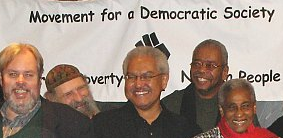[cross-posted at Liberty & Power]
As I mentioned earlier this month, the Movement for a Democratic Society met in Greenwich Village this past Saturday to elect the board of MDS-Inc. (My hotel was located, perhaps inauspiciously, right across the street from the building where three members of the Weather Underground accidentally blew themselves up in 1970.) I’m happy and honoured to announce that I was among those elected. (My thanks to Brad Spangler for initially getting me involved!)
 I’m also pleased by the enormous diversity of the board in general, not only race-wise and gender-wise but ideology-wise. (Some MDS “dissidents,” about whom more below, have claimed that the election of this board was part of some sort of lockstep centralist scheme. If so, it’s the most diverse set of lockstep centralists ever assembled.) And I must say I relish the irony of the co-editor of the Journal of Ayn Rand Studies being on the board of MDS; the only reason Leonard Peikoff isn’t rolling in his grave is that he isn’t dead. (I hope that Murray Rothbard’s spirit, on the other hand, is smiling to see the editor of his Journal of Libertarian Studies in such a role.) (Incidentally, has anyone noticed how similar Rand’s critique of the New Left in “The Cashing-In: The Student ‘Rebellion’” looks like her critique of the libertarian movement?)
I’m also pleased by the enormous diversity of the board in general, not only race-wise and gender-wise but ideology-wise. (Some MDS “dissidents,” about whom more below, have claimed that the election of this board was part of some sort of lockstep centralist scheme. If so, it’s the most diverse set of lockstep centralists ever assembled.) And I must say I relish the irony of the co-editor of the Journal of Ayn Rand Studies being on the board of MDS; the only reason Leonard Peikoff isn’t rolling in his grave is that he isn’t dead. (I hope that Murray Rothbard’s spirit, on the other hand, is smiling to see the editor of his Journal of Libertarian Studies in such a role.) (Incidentally, has anyone noticed how similar Rand’s critique of the New Left in “The Cashing-In: The Student ‘Rebellion’” looks like her critique of the libertarian movement?)
Anyway, a chair and three vice-chairs were also chosen: Manning Marable (who gave a great talk on the prison-industrial complex – and whose website logo incidentally bears a curious resemblance to the logo from Red Dwarf), Judith Malina (who gave an exciting performance of an anarchist poem), Paul Buhle (whose Taking Care of Business does for the history of the labour movement what Gabriel Kolko’s work does for the history of capitalists), and Jesse Zearle (who proposed to do MDS outreach to the hip-hop communtiy).
Here’s Tom Good’s report on the conference; here are two of the speeches, one by Tom on the amazing growth of SDS over the past year, and one by Mark Rudd (the best speech of the convention IMHO). Here’s a photo of the board, with names – not the entire board but just those who were present; some members were elected in absentia. (Not sure why I look like an evil psycho in the picture, but they say cameras tell no lies!) And here are some other photos from the conference.
About those “dissidents,” who occasionally disrupted the meeting and were brusquely silenced – some MDS members seem to feel that the MDS leadership has been acting like anti-democratic centralists shoving decisions down the throats of the membership. Most of the MDS leadership, by contrast, seem to feel that these critics are simply troublemakers trying to disrupt the organisation. Those familiar with my posts (see here and here) on the Mises/Cato feud can probably extrapolate my position on this intra-MDS feud as well, namely, that each side has mistakenly painted the other side’s positions as grossly and obviously unreasonable. In any case, one of the decisions taken on Saturday by the “anti-democratic centralists” was to throw the election of MDS officers open to the general membership. If anti-democratic centralism this be, ’tis an odd sort.
 As for the board, part of the point of its diversity, I gather, is to maximise the constituency that such board members might be able to bring into SDS/MDS. In this connection, I suppose my natural “constituency” is left-friendly libertarians and libertarian-friendly leftists, and I hereby encourage all such to consider getting involved in SDS/MDS (most likely SDS if they’re students and MDS otherwise).
As for the board, part of the point of its diversity, I gather, is to maximise the constituency that such board members might be able to bring into SDS/MDS. In this connection, I suppose my natural “constituency” is left-friendly libertarians and libertarian-friendly leftists, and I hereby encourage all such to consider getting involved in SDS/MDS (most likely SDS if they’re students and MDS otherwise).
Here’s a good online pamphlet introduction to SDS, dating from its glory days; it has the advantages of both brevity and antistate radicalism over the more famous, more reformist Port Huron statement. For what the libertarian / new left coalition was all about, check out the archived issues of Left and Right and the first few years of Libertarian Forum.
Four decades ago SDS played an important role in ending the Vietnam war, ousting two presidents, and popularising a radical critique of the establishment system. What more might SDS have accomplished if it had survived? What more might it yet accomplish now that it’s been revived?
Join us! The struggle against the statocratic/plutocratic empire needs you!
He was asked whether the police had treated him unjustly or unfairly. “Unfairly yes, unjustly no,” he said. “It was unfair to be hit over the head but not unjust since they hit everyone else over the head, too.”